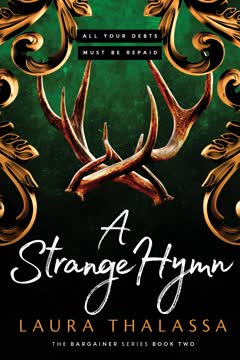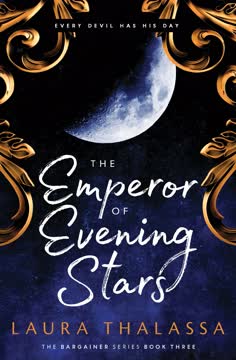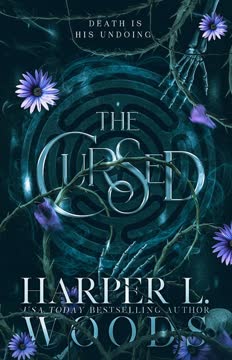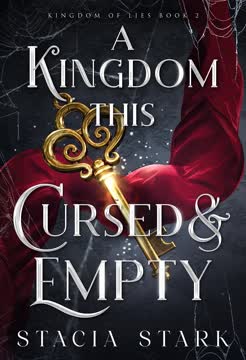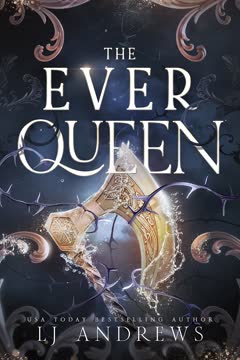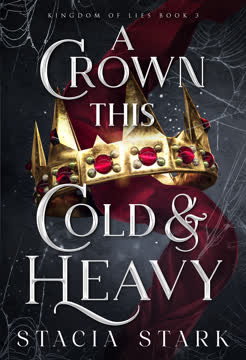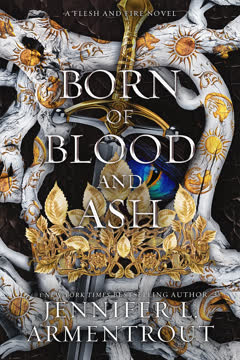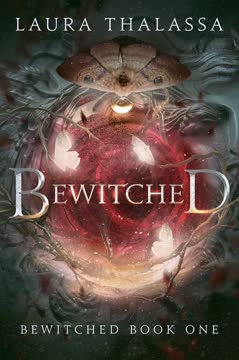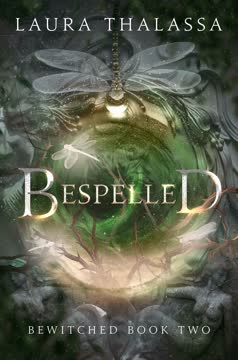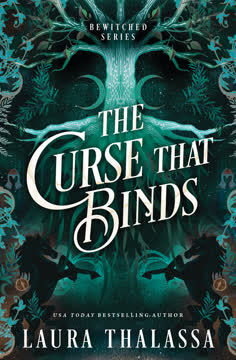Plot Summary
Immortal Bonds Forged Anew
Callie, once human, is now fae—her life extended by centuries after Des, the Night King and her soulmate, saves her with lilac wine. Their magical bond is now unbreakable, but Callie struggles with the loss of her agency in the decision. The two are bound not just by love but by magic, and Callie's new powers—her siren's glamour, her ability to sense magic, and her shifting form—are both a gift and a curse. Des's devotion is fierce, but the shadow of his past and the looming threat of the Thief of Souls cast a pall over their happiness. The beads of favors once owed are gone, replaced by a deeper, more dangerous connection.
Nightmares and Waking Screams
Callie is haunted by nightmares of the Thief of Souls, a monstrous fae who manipulates dreams and reality. The Thief's power is growing, and his obsession with Callie is personal and predatory. When the sleeping women beneath Somnia awaken, their screams echo through the Night Kingdom, signaling the start of a violent uprising. Des and Callie are forced into battle mode, their relationship tested by the chaos and the ever-present danger. The Thief's manipulation of dreams and the waking world blurs the line between safety and threat, leaving Callie vulnerable and desperate for control.
The Army Beneath Somnia
The Night Kingdom is thrown into turmoil as the sleeping soldiers—women once victimized and now weaponized by the Thief—rise and attack. Des and Callie fight side by side, their powers and trust in each other tested to the limit. The battle is brutal, with friends and foes alike falling. Callie's siren powers prove both a weapon and a liability, as she is forced to kill to survive. The Thief's influence is everywhere, and the cost of victory is high. The kingdom's defenses are stretched thin, and the true nature of the threat becomes horrifyingly clear.
Unleashing the Siren's Power
In the aftermath of the battle, Callie discovers her glamour can now control fae as well as humans—a side effect of her transformation. She uses this power to halt the rampaging soldiers, saving the kingdom but earning the awe and fear of its people. The cost of such power weighs on her, as does the knowledge that the Thief orchestrated these events to test her limits. The lines between victim and predator blur, and Callie must reckon with the darkness within herself as much as the darkness outside.
The Thief's Game Begins
The Thief of Souls reveals his obsession with Callie, taunting her in dreams and reality. He manipulates events to draw her closer, using her love for Des as leverage. The Thief's power is revealed to be rooted in death and dreams, and his ability to wear the faces of the dead makes him an ever-present threat. Callie's attempts to fight back are met with cunning and cruelty, and the stakes of their game become increasingly personal and perilous.
Blood and Betrayal in the Night
Des and Callie seek answers in the Banished Lands, uncovering secrets about Galleghar Nyx, Des's father, and his connection to the Thief. The empty tomb of Galleghar signals a deeper conspiracy, and the loyalty of shadows and magic is called into question. Betrayals come from unexpected places, and the cost of trust is steep. The past and present collide as the true nature of the threat is revealed, and the kingdom's survival hangs in the balance.
The Queen's Reckoning
Forced into leadership by necessity and loss, Callie steps into her role as queen. She uses her glamour to bring Galleghar to his knees, exacting justice for his crimes and the suffering he caused. The weight of power and vengeance changes her, and she embraces the darkness within to protect those she loves. The lines between justice and cruelty blur, and Callie's transformation from victim to ruler is complete.
The Banished Lands' Secret
Des and Callie confront King Typhus Henbane in the Banished Lands, exposing his exploitation of his people through cobinding—stealing their magic for his own strength. Callie uses her glamour to force confessions and return the stolen power, toppling Typhus's rule. The encounter reveals the dangers of unchecked power and the importance of loyalty and consent. The Banished Lands serve as a warning of what happens when rulers become monsters.
The Empty Tomb
The discovery of Galleghar's empty tomb signals his return and the deepening of the Thief's plot. The connection between Galleghar and the Thief is revealed to be a cobinding of power and fate, making them nearly invincible. The prophecy that foretold Galleghar's downfall is uncovered, and its implications for Callie and Des become clear. The past's sins refuse to stay buried, and the cost of resurrection is paid in blood and betrayal.
Shadows and Secrets
Des's ability to speak to shadows becomes a key weapon in the fight against the Thief. The shadows, once loyal to Euribios (the Thief's true identity), are swayed by Des's promise of freedom. Secrets are currency, and the truth about the Thief's origins—as a primordial god of darkness and death—comes to light. The battle for control of the shadows becomes a battle for the soul of the world.
The King of the Banished
In the underground city of the Banished, Des and Callie confront the reality of cobinding and the exploitation of the powerless. The king's rule is built on fear and manipulation, and Callie's glamour becomes both a tool of liberation and a source of terror. The encounter forces Callie to confront the ethics of her own power and the responsibilities of leadership. The cost of magic is never free, and every bargain has its price.
Glamour and Confession
Callie uses her glamour to force confessions from Typhus and Galleghar, exposing their crimes and breaking their hold over others. The power of confession and the danger of secrets are laid bare. The act of forcing truth becomes both a weapon and a burden, and Callie must reckon with the consequences of wielding such power. The line between justice and vengeance grows ever thinner.
The Prophecy Unveiled
The prophecy that binds Galleghar, Des, and Callie is revealed, its verses foretelling betrayal, death, and the rise of a new queen. The weight of destiny presses on Callie, but she refuses to be a pawn. Instead, she chooses to shape her own fate, even as the cost grows higher. The past's sins and the future's promise collide, and the battle for the soul of the Night Kingdom reaches its tipping point.
The Day Kingdom's Pyres
Des and Callie travel to the Day Kingdom, where the aftermath of the Thief's war is marked by burning pyres and mass graves. The alliance with Janus, the Day King, is tested by old wounds and new truths. The cost of survival is measured in bodies and broken trust. The need for unity becomes clear, even as the threat of the Thief looms ever larger.
Truths, Dares, and Alliances
Amidst the chaos, Des and Callie find moments of intimacy and levity, playing games of truth and dare that reveal their deepest fears and desires. Their love is both a weapon and a shield, binding them together even as the world falls apart. Alliances are forged and tested, and the strength of their bond becomes the kingdom's last hope.
The Thief's True Face
The Thief's true identity as Euribios, the primordial god of darkness and death, is revealed. His power is nearly absolute, and his obsession with Callie is both personal and apocalyptic. The final battle is not just for the kingdom, but for the soul of the world itself. The cost of victory is steep, and the line between love and destruction is razor-thin.
Descent into Death's Kingdom
With Des lost to the land of the dead, Callie descends into the Kingdom of Death and Deep Earth, guided by Galleghar and driven by love and vengeance. The journey is perilous, filled with monsters, spirits, and the weight of countless dead. Callie's resolve is tested, and her power is pushed to its limits. The underworld is both a grave and a crucible, forging her into the queen she must become.
The Siren's Vengeance
In the heart of the underworld, Callie faces Euribios in a battle of wills and magic. Her siren's glamour, once a source of shame and fear, becomes the weapon that brings down a god. The spirits of the dead, hungry for justice, aid her in drowning Euribios, ending his reign of terror. The cost of victory is high, but Callie emerges triumphant, her power and purpose finally united.
The End of Darkness
With Euribios defeated, Des is freed from the Thief's hold, and the bond between him and Callie is restored. The dead are released, the kingdom is saved, and the cycle of vengeance is broken. Callie and Des return to the world of the living, their love stronger for all they have endured. The kingdom celebrates, and the promise of a new era dawns.
Reunion and Reckoning
In the aftermath, Callie and Des are reunited, their love tempered by loss and sacrifice. The kingdom heals, and old wounds begin to close. Callie embraces her role as queen, and Des as her partner. Together, they face the future, knowing that darkness may return, but so will they—stronger, wiser, and unbreakable. Their story ends not with an ending, but with a promise: from flame to ashes, dawn to dusk, until darkness dies.
Characters
Callypso "Callie" Lillis
Callie is the heart and soul of the story—a siren who begins as a victim of fate and becomes the architect of her own destiny. Her journey is one of transformation: from human to fae, from prey to predator, from lover to queen. Her relationship with Des is both her greatest strength and her deepest vulnerability. Callie's power—her glamour—mirrors her internal struggle with agency, consent, and the ethics of control. Her trauma, resilience, and capacity for vengeance drive the narrative, and her ultimate victory is as much over her own fears as it is over her enemies.
Desmond "Des" Flynn
Des is the enigmatic, fiercely loyal King of Night, whose love for Callie is both redemptive and destructive. Marked by a traumatic past—his father's cruelty, the loss of his mother, and the burden of prophecy—Des is a master of bargains and secrets. His power over shadows and his ability to speak to them become crucial in the battle against the Thief. Des's willingness to sacrifice himself for Callie, and his trust in her strength, are central to their partnership. His journey is one of learning to share power, trust, and vulnerability.
The Thief of Souls / Euribios
Euribios, the Thief of Souls, is the story's ultimate antagonist—a being of ancient power, capable of manipulating dreams, death, and identity. His obsession with Callie is both personal and symbolic: he seeks to possess what he cannot control, and his downfall is his inability to understand love, loyalty, or the limits of power. Euribios's relationship with Galleghar and his manipulation of the dead make him a force of apocalyptic threat. His defeat is not just a victory for the protagonists, but a restoration of balance to the world.
Galleghar Nyx
Galleghar is Des's father and the catalyst for much of the story's tragedy. His quest for immortality leads him to unleash the Thief, setting in motion the events that nearly destroy the world. Galleghar's cruelty, pride, and inability to love or trust are his undoing. His relationship with Des is marked by betrayal and violence, and his eventual defeat is both personal and symbolic—a reckoning for the sins of the past.
Temperance "Temper" Darling
Temper is Callie's anchor and confidante, a human with formidable magical power and an even more formidable personality. Her loyalty, humor, and willingness to fight for those she loves make her indispensable. Temper's relationship with Malaki adds depth to her character, and her presence provides both comic relief and emotional grounding. She is the embodiment of chosen family and the power of friendship.
Malaki
Malaki is Des's right hand and Temper's lover, a warrior marked by scars and loyalty. His ability to weave dreams becomes both a weapon and a vulnerability in the fight against the Thief. Malaki's relationship with Temper is a subplot of healing and trust, and his steadfastness provides stability amidst chaos.
Janus Soleil
Janus is the King of Day, a powerful fae whose alliance with Des and Callie is forged in fire and loss. His kingdom's destruction and his own struggles with power and pride mirror the larger themes of the story. Janus's interactions with Callie and Des are marked by rivalry, respect, and the necessity of unity in the face of existential threat.
Mara Verdana
Mara is the Queen of Flora, a ruler marked by loss and regret. Her relationship with the Green Man (the Thief in disguise) is a cautionary tale of love, deception, and the cost of power. Mara's alliance with Callie is born of shared suffering, and her presence underscores the story's themes of trauma, resilience, and the possibility of redemption.
Typhus Henbane
Typhus is the self-styled king of the Banished Lands, a ruler who gains power by stealing it from others. His downfall at Callie's hands is a microcosm of the story's larger themes: the dangers of unchecked power, the importance of consent, and the necessity of justice. Typhus's fate serves as a warning of what happens when rulers become monsters.
The Shadows
The shadows are more than a plot device—they are a living, sentient force that both empowers and betrays. Their loyalty to Des and eventual betrayal of Euribios are pivotal to the story's resolution. The shadows symbolize the power of secrets, the importance of trust, and the possibility of redemption even for the darkest parts of ourselves.
Plot Devices
Duality of Power and Consent
Callie's siren glamour, Des's bargains, and the Thief's manipulations all revolve around the ability to control others. The narrative structure repeatedly tests the boundaries of agency, [consent](#duality-
Last updated:
FAQ
Synopsis & Basic Details
What is Dark Harmony about?
- A Siren's Fae Transformation: Dark Harmony follows Callypso "Callie" Lillis, a former human turned fae siren, as she navigates her new immortal life and powers, magically bound to Desmond "Des" Flynn, the enigmatic King of Night. The story delves into their deepening relationship amidst a looming war in the Otherworld.
- The Thief of Souls' Reign of Terror: The central conflict revolves around the malevolent Thief of Souls, later revealed as Euribios, a primordial god of darkness and death, who manipulates dreams, raises armies of the dead, and seeks to plunge the Otherworld into eternal oblivion. His personal obsession with Callie drives much of the plot.
- A Quest for Vengeance and Salvation: After Des is seemingly lost to Euribios's realm, Callie, embracing her full siren power and her role as Queen of Night, embarks on a perilous journey into the Kingdom of Death and Deep Earth to rescue her soulmate and defeat the ancient god, ultimately saving the Otherworld from annihilation.
Why should I read Dark Harmony?
- Deep Dive into Fae Lore: Readers who enjoy rich, intricate fantasy worlds will appreciate the expanded lore of the Otherworld, exploring new kingdoms, ancient gods, and the complex magic system, including cobinding and sentient shadows. The novel offers a unique blend of dark fantasy and passionate romance.
- Empowering Heroine's Journey: Callie's transformation from a traumatized human to a powerful, self-assured fae queen is incredibly compelling. Her struggle with her siren nature, her past, and her newfound responsibilities makes for a deeply emotional and empowering character arc.
- Intense Romance and High Stakes: The unbreakable bond between Callie and Des is at the heart of the story, offering a fiercely loyal and passionate romance that withstands betrayal, death, and the threat of cosmic annihilation. The high-stakes plot ensures constant tension and thrilling action.
What is the background of Dark Harmony?
- A World of Interconnected Fae Kingdoms: The story is set in the Otherworld, a magical dimension accessible from Earth via ley lines, comprising various fae kingdoms like Night, Day, Flora, Fauna, Mar, and the newly revealed Death and Deep Earth. Each kingdom has unique characteristics and rulers, contributing to a complex political and magical landscape.
- Ancient Prophecies and Primordial Gods: The conflict is rooted in ancient history, involving a prophecy concerning Galleghar Nyx (Des's father) and the re-emergence of Euribios, a primordial god of darkness. This deep mythological background explains the Thief's immense power and his apocalyptic goals.
- Trauma, Power, and Identity: The narrative is heavily influenced by the characters' past traumas, particularly Callie's experiences with abuse and Des's history with his tyrannical father. These personal histories shape their motivations and the way they wield their powers, exploring themes of identity, agency, and the duality of good and evil.
What are the most memorable quotes in Dark Harmony?
- "Stars, hide your fires; Let not light see my black and deep desires.": This epigraph, a quote from Shakespeare's Macbeth, perfectly encapsulates the dark, ambitious, and often morally ambiguous desires that drive many characters, especially Des and the Thief, setting a foreboding tone for the novel's exploration of power and hidden motives.
- "People like us are not victims. We're someone's nightmare.": This powerful declaration, first uttered by Des and later embraced by Callie, defines their shared identity and resilience. It signifies their transformation from those who have suffered to those who wield power and exact justice, highlighting their capacity for both darkness and protection.
- "Until darkness dies.": This phrase, part of Des's wedding vows to Callie, becomes a central motif and a literal promise. It represents their enduring love and commitment, but also the ultimate goal of their fight against Euribios, the primordial god of darkness, giving their personal bond cosmic significance.
What writing style, narrative choices, and literary techniques does Laura Thalassa use?
- First-Person, Intimate Perspective: The story is primarily told from Callie's first-person point of view, offering an immediate and deeply personal insight into her thoughts, emotions, and experiences. This narrative choice fosters strong reader empathy and allows for a raw, unfiltered exploration of her trauma and growth.
- Sensory-Rich and Visceral Language: Thalassa employs vivid, often visceral descriptions, particularly in action sequences and intimate moments. Her language appeals strongly to the senses, immersing the reader in the Otherworld's beauty and brutality, and making Callie's emotional and physical sensations palpable.
- Foreshadowing and Thematic Repetition: The author skillfully uses foreshadowing through dreams, prophecies, and recurring phrases (like "small death" or "secrets are meant for one soul to keep") to build suspense and connect seemingly disparate plot points. The repetition of themes like power, consent, and the nature of evil reinforces the novel's deeper messages.
Hidden Details & Subtle Connections
What are some minor details that add significant meaning?
- Des's Mother's Song as a Foreshadowing Lullaby: The melancholic song Des hums to comfort Callie, "'For my Lost Love, I Dream of Thee'," is revealed to be his mother's lullaby about a man yearning for reunion in dreams. This seemingly tender detail subtly foreshadows Des's eventual "death" and Callie's journey into the dream-like realm of the dead to find him, linking his past grief to their future struggle. This is a key detail for Dark Harmony analysis.
- The Thief's Cold Touch and Galleghar's Body: Callie notes the Thief's "clammy and cold" flesh in her dream, a detail that initially seems like a dream-like distortion. This subtle characteristic later gains significance when she realizes he is the King of Death, whose touch would naturally be devoid of warmth, hinting at his true nature long before his identity is revealed. This is a crucial Thief of Souls explained element.
- Typhus's Bone Necklaces as a Mirror to Des's Tattoos: Typhus Henbane's crude necklaces made of "teeth and bones" from his victims are a grotesque parallel to Des's own tattoos, particularly the rosary of black beads that represent his favors. While Des's marks symbolize earned debt and connection, Typhus's symbolize stolen life and power, subtly highlighting the duality of power and its ethical use, a core themes in Dark Harmony element.
What are some subtle foreshadowing and callbacks?
- The Shadows' Silence on the Thief: Early in the book, Des reveals that the shadows, his primary source of secrets, "won't speak of him" when asked about the Thief of Souls. This silence is a subtle but powerful foreshadowing of the shadows' eventual betrayal of Euribios, indicating their deep-seated fear or allegiance, and later, their willingness to turn against him when offered true freedom. This is a key Desmond Flynn secrets detail.
- Callie's "Naughty Chest" and the Nature of Justice: Callie's hidden box of "mementos" from criminals she's brought to justice, like the human trafficker's tooth, serves as a callback to her past as a PI and subtly foreshadows her ruthless approach to Galleghar. It establishes her capacity for "delightfully cruel" justice, preparing the reader for her decisive actions against the former Night King and Euribios, a crucial aspect of Callie Lillis motivations.
- The Prophecy's Dual Interpretation: Galleghar's prophecy, particularly the line "Beware the mortal, Beneath your sky, Crush the human, Who'll see you die," is initially interpreted as a warning against Callie. However, the ending reveals a subtle reinterpretation: Callie, the "mortal," does indeed "see [Galleghar] die" by breaking his bond with Euribios, fulfilling the prophecy in an unexpected way and highlighting the ambiguity of fate. This is a key Dark Harmony prophecy explained element.
What are some unexpected character connections?
- Mara Verdana's Past with the Thief: The revelation that Mara Verdana, the Flora Queen, had a romantic past with the Thief (disguised as the minstrel Lazaret) and that he also seduced her sister, Thalia, creates an unexpected and tragic connection. This deepens Mara's character, explaining her jadedness and providing a chilling parallel to Callie's own entanglement with Euribios, emphasizing the Thief's long history of manipulation. This is a crucial Mara Verdana analysis.
- Des's Childhood Friendship with the Shadows: Des's confession that the shadows were his "first friends" as a lonely boy on Arestys reveals an unexpected emotional depth to his connection with them. This personal history explains their fierce loyalty to him, even against their primordial god, and underscores the theme that even the darkest entities can be swayed by genuine connection, a vital Desmond Flynn character development insight.
- Kharion the Ferryman's Imprisonment: The discovery of Kharion, the ferryman of the dead, shackled and imprisoned by Euribios, reveals an unexpected disruption in the natural order of the afterlife. This detail highlights the extent of Euribios's tyranny, showing that even the essential functions of death are corrupted, and sets the stage for the dead souls' eventual aid to Callie. This is a key Kingdom of Death and Deep Earth lore.
Who are the most significant supporting characters?
- Temperance "Temper" Darling: Beyond her role as Callie's best friend and comic relief, Temper is a powerful sorceress whose unwavering loyalty and magical prowess are crucial. Her willingness to defy Malaki and stand by Callie, even against a god, underscores the theme of chosen family and provides a vital emotional anchor for Callie. Her developing relationship with Malaki also offers a contrasting, more grounded romance.
- Malaki, Lord of Dreams: Des's general, Malaki, is more than a loyal warrior; his title as "Lord of Dreams" and his ability to "spin dreams" are critical. His attempt to enter the Thief's realm and his subsequent incapacitation highlight the Thief's immense power over dreams, while also revealing Malaki's deep concern for Callie and his evolving relationship with Temper. His dreamweaving ability is a subtle counterpoint to Euribios's control over "small death."
- Mara Verdana, Queen of Flora: Mara's tragic story of being deceived and violated by the Thief (as the Green Man) provides a crucial historical context for Euribios's methods and motivations. Her shared trauma with Callie creates an unexpected bond, and her insights into the Thief's nature and the corruption of her kingdom serve as a dire warning and a catalyst for Callie's resolve. Her character emphasizes the long-term consequences of Euribios's actions.
Psychological, Emotional, & Relational Analysis
What are some unspoken motivations of the characters?
- Des's Fear of Losing Callie (Again): While Des explicitly states his fear of losing Callie, his deeper, unspoken motivation is rooted in the seven years of agonizing separation he endured. This past trauma drives his overprotective tendencies, his secrecy regarding the Thief's plans, and his ultimate sacrifice, all stemming from a profound terror of reliving that loss. This is a key Desmond Flynn motivations insight.
- Callie's Desire for "Normal" as a Shield: Callie frequently expresses a desire for a "normal life" and resists the title of queen. This isn't just a preference; it's an unspoken coping mechanism. Her past trauma and the chaos of her life make the idea of normalcy a psychological shield against the overwhelming, dangerous reality of her existence, a longing for peace she believes is unattainable. This is a crucial Callie Lillis psychological analysis.
- Euribios's Need for Validation and Entertainment: Beyond his stated goal of annihilation, Euribios's constant taunting, games, and desire for Callie's "amusement" reveal an unspoken motivation: a profound, ancient boredom and a need for validation of his power. He doesn't just want to conquer; he wants to be acknowledged and entertained by the struggle, making his cruelty a form of perverse engagement. This is a key Thief of Souls motivations.
What psychological complexities do the characters exhibit?
- Callie's Duality of Siren and Human Conscience: Callie grapples with the psychological complexity of her siren nature, which revels in violence and seduction, versus her human conscience, which is horrified by it. This internal conflict is evident when she feels "nauseous and horrified" by battle but her siren "preens" at it, or when she enjoys twisting Galleghar's will while simultaneously feeling the weight of her actions. This is central to Callie Lillis character development.
- Des's Mask of Control and Hidden Vulnerability: Des consistently projects an image of ruthless control and cunning, but beneath this mask lies deep vulnerability and fear, particularly concerning Callie. His "stoic expression" often hides "turbulence" and "immense rage," revealing a complex internal struggle to maintain composure while battling profound emotional turmoil. His admission of fear is a rare glimpse into this hidden side. This is a key Desmond Flynn psychological analysis.
- Euribios's Ancient Boredom and Sadistic Curiosity: Euribios exhibits the psychological complexity of an ancient, primordial being for whom existence has become a tedious game. His sadism isn't just about inflicting pain; it's about observing reactions, testing limits, and finding novelty in suffering. His "fascinated sheen" and "malicious glee" when tormenting Callie stem from a deep-seated, almost scientific curiosity about the human and fae psyche. This is a crucial Euribios character study.
What are the major emotional turning points?
- Callie's Acceptance of Her Siren's "Wickedness": A major emotional turning point occurs when Callie, after realizing her glamour works on fae, consciously decides to "let that control slip just a little" during the battle in Somnia. This marks her shift from resisting her siren's "viciousness" to embracing it as a necessary tool for survival and protection, a pivotal moment in her journey to becoming a queen. This is a key Callie Lillis emotional arc.
- Des's Confession of Fear and Vulnerability: Des's raw admission, "I am mad with fear for you," after Callie goads the Thief, is a significant emotional turning point for him. It shatters his usual stoic facade and reveals the depth of his love and vulnerability, allowing for a deeper intimacy and trust to form between him and Callie, despite his continued secrecy. This is a crucial Desmond Flynn relationship analysis.
- Callie's Grief-Fueled Determination after Des's "Death": The most profound emotional turning point is Callie's reaction to Des's apparent death. Her initial "agony" and "panic" quickly transform into "cold, hard determination" and a vow to "scour the underworld for my lost mate." This grief-fueled resolve solidifies her identity as a queen and avenger, driving her into the Kingdom of Death and Deep Earth. This is a key Dark Harmony emotional moments.
How do relationship dynamics evolve?
- Callie and Des: From Bargain to Unbreakable Partnership: Their relationship evolves from one based on favors and a mate bond to an unbreakable partnership forged through shared trauma and mutual respect. Des learns to trust Callie's power and agency, while Callie learns to trust Des's love and intentions, culminating in their marriage and shared rule. Their dynamic shifts from Des as the sole protector to a true co-ruler. This is a central Callie and Des relationship development.
- Callie and Temper: Deepening Sisterhood in Crisis: The bond between Callie and Temper deepens significantly, moving beyond friendship to a fierce, unwavering sisterhood. Temper's willingness to defy Malaki and stay by Callie's side during her deepest grief, offering unconditional support, highlights the strength of their chosen family. Their shared moments of vulnerability and humor reinforce their indispensable connection. This is a key Temperance Darling friendship.
- Des and Malaki: From General to Brother-in-Arms: The relationship between Des and Malaki, initially that of king and general, evolves into a brotherhood. Their shared history and loyalty are evident, but Malaki's concern for Des's well-being and his eventual acceptance of Temper as his mate solidify a deeper, more personal bond, moving beyond professional duty to familial affection. This is a crucial Malaki character connections.
Interpretation & Debate
Which parts of the story remain ambiguous or open-ended?
- The Full Extent of the Shadows' Sentience and Agency: While Des explains that shadows are sentient and have free will, the exact nature and limits of their agency remain somewhat ambiguous. It's unclear how much of their "betrayal" of Euribios was truly independent choice versus Des's manipulation, leaving room for debate on the ethics of his actions and the true nature of the darkness he commands. This is a key Dark Harmony symbolism debate
Review Summary
Dark Harmony concludes The Bargainer series with mixed reviews. Many readers praise the romance between Callie and Des, finding their relationship deeply satisfying. The dark fantasy elements and world-building also receive acclaim. However, some criticize the pacing, excessive sex scenes, and underdeveloped side characters. The conclusion to the overarching plot involving the Thief of Souls garners both praise and criticism. Overall, fans of the series find it a fitting end, while others feel it falls short of earlier installments. Despite divided opinions, most agree the series is an entertaining paranormal romance.
The Bargainer Series
Similar Books
Download PDF
Download EPUB
.epub digital book format is ideal for reading ebooks on phones, tablets, and e-readers.


